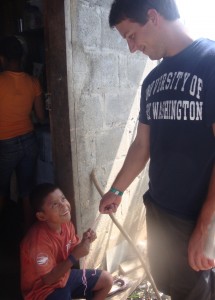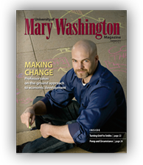
In January in El Progreso, Yolanda Reyes took part in La Ceiba’s first business-plan competition. The student microfinance group awarded a total of $625 to three Honduran entrepreneurs there. Photo provided by La Ceiba.
Humphrey’s experience with poverty didn’t start in Honduras. He grew up in North Bend, Ohio, near Cincinnati. His parents divorced when he was a toddler, and his mother then married a man who worked a string of low-paying jobs. Humphrey, his older sister, and a younger stepsister grew up without much. “I’ve witnessed the repo man taking our cars,” he said. “I’ve taken white bread and put it in a ball, and that would be my dinner sometimes. We were poor.”
Football helped Humphrey get to college. His athletic ability and the help of a devoted high school coach made the difference. The coach had played football at Earlham College and helped Humphrey get scholarships so he could attend the Richmond, Ind., school. At 41, Humphrey still looks like the strong safety he was on the field. “I was pretty quick and could hit pretty hard,” he said.
Humphrey earned a bachelor of arts at Earlham in 1993, a master’s degree from Virginia Commonwealth University in 1996, and a doctorate from Washington University in St. Louis in 2002, all in economics. He spent three years as an assistant professor of economics at California State University San Marcos before joining the Mary Washington faculty. Humphrey and his wife, Kyra Haigh, live in Richmond with their son, Dillon, 7.
Humphrey has a formal mission statement for his teaching: Articulate and act upon a set of best practices for engaging students in the implementation of responsible, effective, and sustainable economic development projects.
But students find him approachable, even informal. On his comparative economics class syllabus he wrote, “I am more than willing to talk about class, the challenges of being a college student, careers, or life in general.”

La Ceiba members, such as Daniel Tees (above), have a lot to accomplish in the short time on the ground in Honduras, but they aspire not to lose sight of the people they are there to help. Photo provided by La Ceiba.
Humphrey received the UMW Alumni Association Outstanding Young Faculty Member Award in spring 2009.
In Honduras, Humphrey and the students who join La Ceiba work and live elbow-to-elbow for two weeks. “We spend hours after we get done with our work just talking,” he said. The walls between professor and students come down, “and we never end up building the walls back up because our relationships are transformed. So there’s an openness and honesty with them.”
The relationships La Ceiba members have with clients are critical as well. Because loan recipients have little experience in traditional banking, they need frequent contact and support. Often, those interactions affect students the most.
This spring Alvarez was working with Suyapa Santamaria, who was seeking a loan to buy a freezer for the small store she runs from her house in Villa Soleada, a village largelyconstructed by SHH volunteers. Alvarez spoke with Santamaria via Skype about her plans.
Though Alvarez’s Spanish is good, she’s not fluent, so the conversation was clumsy at first. “I had to almost talk myself into talking to this woman. She was telling me about [her business], and I was scribbling down notes. After a while she started getting teary-eyed and said, ‘Your being here means so much to me,’ ” Alvarez said. “If that isn’t enough to make you want to work to the ends of the world, then I don’t know what would. That’s when I knew this wasn’t just going to be a semester project.”
